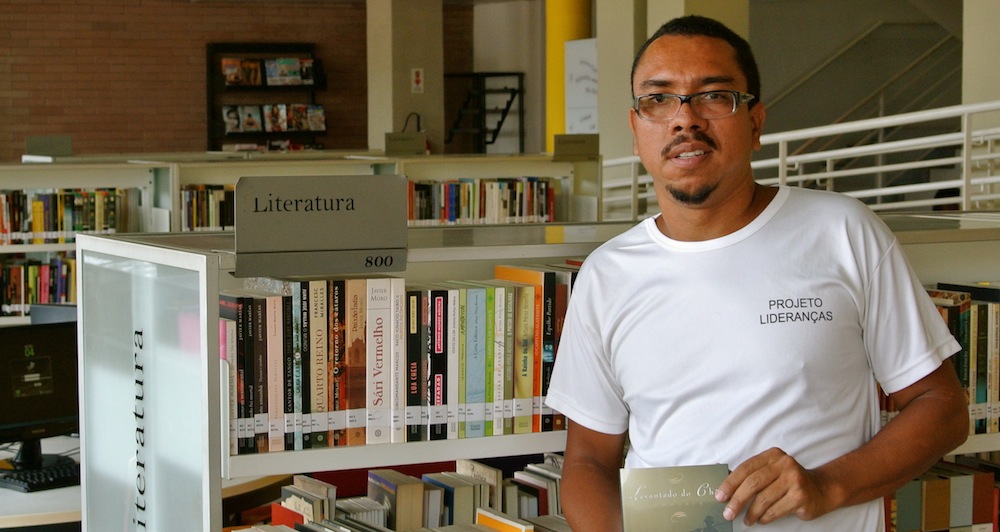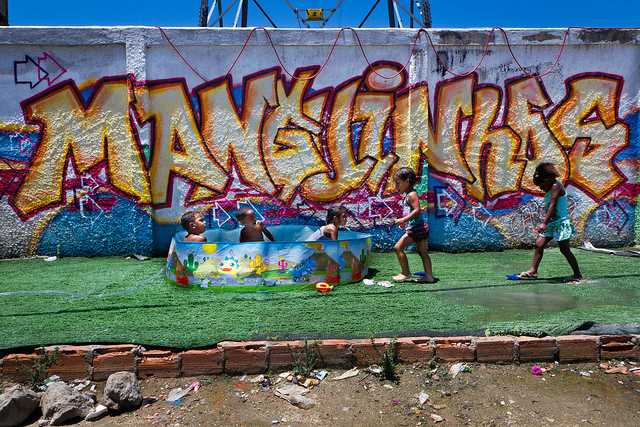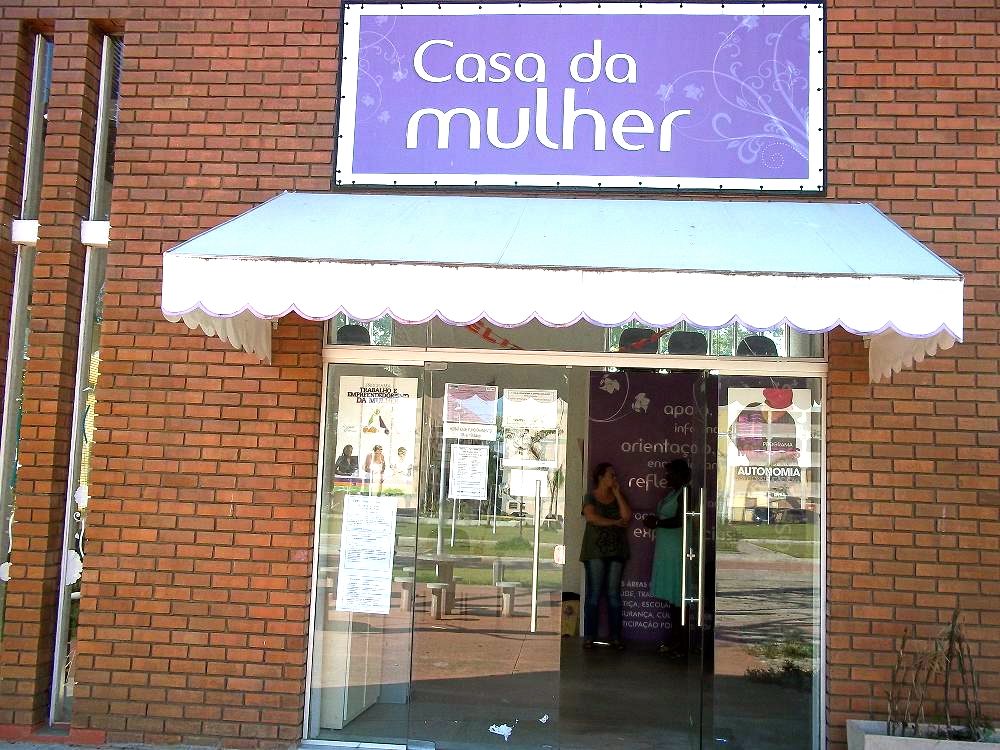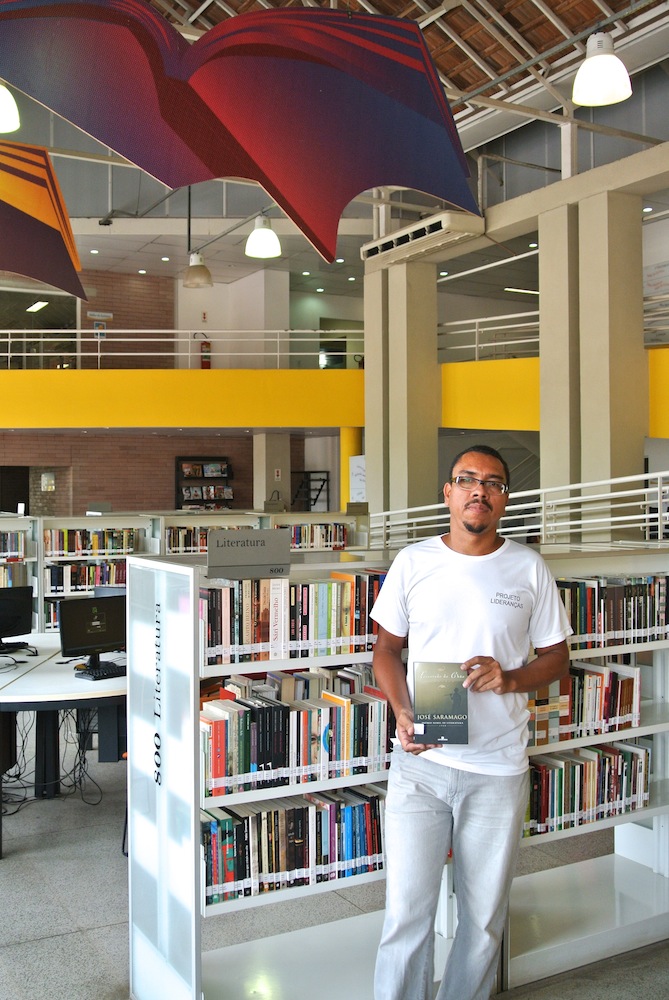 José Luiz da Silva Soares, known as Luiz Soares, is the Social Mediator at the Manguinhos Park Library. Luiz is 41 years old, was born in Tijuca, and lived in various neighborhoods of Rio de Janeiro before moving to the Complexo de Manguinhos favela in the North Zone of Rio in 1995. As he was already an adult, it was a big change in his life. Despite this, Luiz never left. “The good things we see in the favela are solidarity, friendship, union—this is really cool, this is priceless,” he says.
José Luiz da Silva Soares, known as Luiz Soares, is the Social Mediator at the Manguinhos Park Library. Luiz is 41 years old, was born in Tijuca, and lived in various neighborhoods of Rio de Janeiro before moving to the Complexo de Manguinhos favela in the North Zone of Rio in 1995. As he was already an adult, it was a big change in his life. Despite this, Luiz never left. “The good things we see in the favela are solidarity, friendship, union—this is really cool, this is priceless,” he says.
He started to become involved in social work in several communities throughout the city, and in 2010 he took on his current position in the library. Luiz works to orient residents to their rights and guarantee they are fulfilled, guiding them to the social welfare department. In this interview, we talk to him about his life history, his role as a community organizer, and his vision for Manguinhos.
ROW: What are your first memories of Manguinhos?
LS: I was unemployed. I was a can collector, I collected recyclable material—I completed high school, but I couldn’t find a place in the job market. I came to a miserable, very poor place here. It was a very different reality because I had never lived in the favela—I always lived on the asphalt [formal city] in an apartment.
When I arrived here to live in the community, it was a big change—alleys, dirt roads. When it rained, it filled the alleys, including where I lived. There were cockroaches and rats, and I always had to put out poison for them, always afraid that the children would get to the poison and tragedy would ensue. So, it was very complicated when I arrived here.
 But despite all of this, I like it here because it is a good place logistically speaking. And I formed a friendship network—my wife with whom I constituted a family had already spent 17 years in the community and already had a network of friends. She passed away and I preserved that network and I remained in the community. I built a family, but then I became a widower with six children to take care of. Over time, two died through involvement with drug trafficking.
But despite all of this, I like it here because it is a good place logistically speaking. And I formed a friendship network—my wife with whom I constituted a family had already spent 17 years in the community and already had a network of friends. She passed away and I preserved that network and I remained in the community. I built a family, but then I became a widower with six children to take care of. Over time, two died through involvement with drug trafficking.
People are very humble, very helpful—if a house is on fire, everyone helps to put it out. When the lights are out, you have neighbors that help you get them turned back on. And this type of treatment is very welcoming. Because of the removals of communities, people are usually very united—they have a very strong bond. It is a people who have suffered a lot, punished by the life of nature. Solidarity is always in first place.
When you live in an apartment, sometimes you don’t even know the name of your next door neighbor—you don’t have this connection. Here that isn’t the case; here you see a rooted friendship. You can come here today, you can begin to live here, and in 15 days you already know half of the favela.
ROW: Please tell us how your story led to your role as a community organizer.
LS: I lived here in Manguinhos and we went to a community called Parque Everest. I went with the program Citizen Check [a State program in which citizens in need receive money for food] at that time—I had a big family and I needed some resources, right? And I saw that with a high school diploma, I could help. There I learned what it was to work for the community. I worked in the social (not-for-profit) sector without realizing it was the social sector. I didn’t have the desire to study, to go beyond high school. My focus was to work, eat, and help my family. And then I got a job, but I saw that my strength was with poor people, like myself.
My first training course in this area was a community leadership course given by the Rio de Janeiro State Federation of Favelas (FAFERJ). There I met Mr. José Pereira—a man that had community in his soul, a very good man, who was poor but didn’t have the desire to make money. With Mr. Zé, if you knew how to fix a motorcycle, you earned a grant to teach in your favela. He made you multiply your knowledge: you would not go to the grave with your knowledge—you would pass it on.
I see a federation such as this as having this function, and not as a branch of a political campaign. To have politics for life, yes! Party politics, I’m out. I am never represented by groups that facilitate electioneering. Our problem isn’t a party problem, it is a problem of the political-economic system. Neoliberalism is a cancer, where you can’t be equal to me, we cannot be winners, there can only be one winner—either me or you. So this soon creates a dispute. Where there is dispute, there cannot be peace, there cannot be harmony, there cannot be growth.
Growth, that the government speaks so much about, shouldn’t be growth of (development and social welfare) projects, it should be growth in the quality and content of life. There’s no point having more and more projects—you are going to transfer income until you die, and it won’t resolve anything, and you will create people dependent on this income! They won’t be a person, citizen-protagonist of change and of their own transformation.
ROW: What are the greatest changes Manguinhos has seen in recent years?
 LS: Manguinhos has got public services that didn’t exist—neither here nor nearby. Here, for example, we have a Women’s House [a social service organization serving women], a People’s Pharmacy [part of a Federal program to provide affordable medication to the public], and a Family Clinic [part of a State program to increase public access to health care] to meet the public’s needs in this region, and a modern train station. I was even a little emotional when I went in. It was a well-applied investment.
LS: Manguinhos has got public services that didn’t exist—neither here nor nearby. Here, for example, we have a Women’s House [a social service organization serving women], a People’s Pharmacy [part of a Federal program to provide affordable medication to the public], and a Family Clinic [part of a State program to increase public access to health care] to meet the public’s needs in this region, and a modern train station. I was even a little emotional when I went in. It was a well-applied investment.
Now, we continue having problems that must be resolved. So we created a working group, the library hurried along this discussion, to have pruning, weeding, and trash cans in the plaza. Because all of this is something that should be there—people were throwing things on the ground because they didn’t have anywhere to put it.
ROW: Before all of this, how was the relationship between the community and the State?
LS: It was a reasonable relationship, between the presidents of the associations and the public officials. Their life was to send notices, solicit… However, with time leaders stopped believing in the work—who are you going to complain to? No one responds, so they become discouraged. And I can’t deny their reasoning, it’s not easy. But as it is we who live here, it is we who have to give force to leaders.
ROW: And now? How is the relationship?
LS: Now we are going to have a meeting with Light [electric utility], here in the library. The Pacifying Police Unit (UPP) called various public officials who are champions of complaints—such as Light and CEDAE [water utility], so they can explain themselves before the residents. The residents complain about the UPP, which has become a sounding board. Women, when there is no water or electricity go to the door of the UPP to demand that the area captain take steps. And they help a lot, planning meetings and bringing these figures that we need.
Here there are still a lot of very precarious things. However, now the public lighting is a good thing: there was an alley that didn’t have light for years. Today it is lit. We provoked Rio Luz [public lighting utility], and they came to fix a bunch of burnt out lights. It is important to maintain this relationship between residents and public agencies. If we provoke a public agency, they don’t come to do their job. How else are we going to overcome a history of a divided city if we don’t resolve this? We have to resolve it. We are citizens like everyone else in the city.
ROW: And in terms of public security?
LS: There is not a lot to do because the community is tranquil. I didn’t notice much of a difference with the UPP. Many streets were opened up because, historically, there were blockades; many dark alleys were lit because more services started to arrive. So this all helped a lot, but there is still a lot to do, a lot.
ROW: What can be done?
LS: What can be done? These agencies should act more. The City and the State should act more and contract more residents to work on the teams that are brought here. There are many people from outside, but it should be more people from the area. I think this would work better. But there are great services. The Worker’s House, which issues work cards and also sends people to jobs, is an important facility in this area.
There is also the community garden, the largest in Latin America, that I thought was fantastic. It was the project that most employed residents that I’ve seen. The idea is to form a cooperative with these residents, for them to be autonomous. So I liked it because it prevented having someone dominate, and always just giving a helping hand. You have to be autonomous. A person has to be the protagonist of his or her own life. They have to be the protagonist of their own ambitions. You cannot be the hostage of someone who is in control. If not, the history of freedom, the history of empowerment, and the history of social justice is over.
ROW: What would be your ideal for Manguinhos?
 LS: The ideal for Manguinhos is to have respect for the history of home removals. I was one of the first people removed in 2009. I did very well, I went to a better house—I stayed in the same area, I just changed my address. At the time there was little demand, so I got the house easily.
LS: The ideal for Manguinhos is to have respect for the history of home removals. I was one of the first people removed in 2009. I did very well, I went to a better house—I stayed in the same area, I just changed my address. At the time there was little demand, so I got the house easily.
Today, it is more difficult. There are many people looking for homes without success. Many are forced to go to other areas. So, what is lacking in Manguinhos is a greater respect in this sense. There are many elderly people who don’t want to leave, and they suffer a lot because of the move.
And the environmental part is very poor. Manguinhos is a territory without much green. The Growth Acceleration Program (PAC) brought some trees, but Manguinhos itself never had investment in the green area. Another thing that is lacking is greater mobilization for residents to get more training. Many people have lived in the community for a long time, but they don’t know where to do a good course, where to become more qualified. And at times it is possible to do it—there are some free courses around, but the majority doesn’t have access.
ROW: What is your most important message for a young person frustrated with the state of things or interested in becoming involved in social projects?
LS: I believe this young person should get a little more experience with social movements, the movements that fight for the worker, and to guarantee human rights. He still is beginning his life, and he has many years in front of him. He has to have a little patience, pick his chin up, because many succeed when they apply themselves. Not everyone who fights wins, but all those who win do so because first they fought.
He has everything: he has health, he has youth in his favor. He can start many things that an older person can no longer achieve. He still has hope, he has many things in his future. It is an enormous country, with many opportunities. With this, the greatest inheritance that a father can give to his poor, frustrated, disillusioned and depressed son is wisdom and education.
Favela youth from 14 to 24-years in age are the group most assassinated in violent killings—the black and northeastern population. I had two children killed within this profile, black and poor from the favela. And I am an activist because of this. I don’t want us to lose anyone else. I am doing my part.
